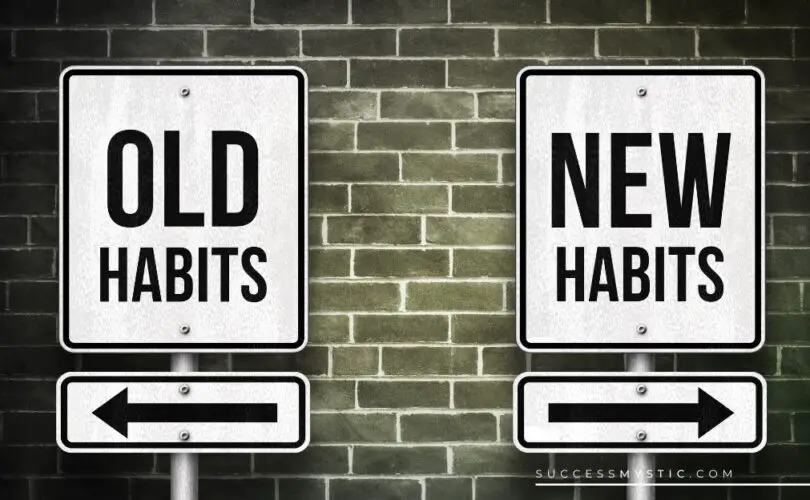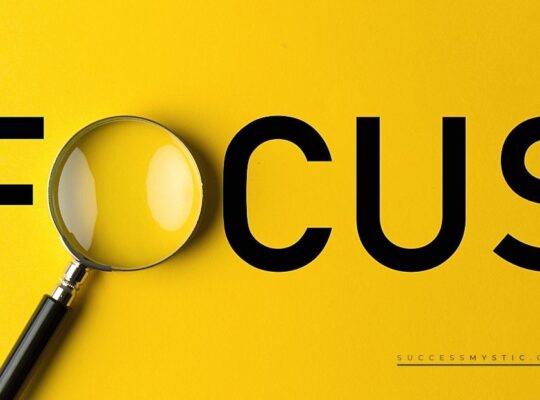The Power Of Habits
Are you currently living your dream? Or are you stuck in a limbo where you would rather not be living? If you don’t think you’re in a place or position in your life that you love, you have no one to blame, as it is your responsibility to shape your own destiny. And one of the ways you can do this is by employing the power of positive habits to transform your life.
Habits are a very powerful thing, even if they aren’t positive ones. Most habits are formed when you are a child and carry on into adulthood. But this doesn’t mean that you aren’t continually forming new habits as an adult, you just may not notice it as readily as you did when you were younger.
The reason that habits are so powerful is because it is your brain doing things without you prompting it. And this means a habit is something you will continue to do no matter what else may be going on in your mind. So, if you can establish positive habits in your brain, this will be a huge step to helping you stay on the path to your goals even when other things may come up in your life that temporarily distract you.
Habits also help your brain conserve energy because tasks are automated and occur without you having to think about doing them. This saves you energyand, over time, thanks to your habits, completing positive tasks will become easier and easier.
But this also means that you need to be very careful with the habits you establish because if you create bad habits, you will continue to do these unconsciously without thinking as well.
Two Types Of Thinking
The reason your brain is able to create habits is because it basically has two different settings. One setting is where you tell it what to do, and it reacts to your inputs. The other, or second, setting, is when it operates automatically without you having to think very hard, if at all.
An example of the first setting would be how you feel when you are planning a vacation. You probably have to use your brain power to think of where you will go, what you will do, and where you will stay. For the second setting, think of getting ready for work in the morning, or even just breathing, as both of these things tend to happen without you having to think about doing them.
Look at it this way, mode one is you giving inputs into your brain, while mode two is the brain functioning automatically. This second mode is where your habits are once, they are established.
When you create a habit, you move something from setting one of your brain over to setting two. And this habit, which is created, is able to execute automatically thanks to something known as the habit loop.
The Habit Loop
Besides just discussing the two types of thinking your brain does, it’s also important to discuss the habit loop, and in what way this can affect how easy or difficult it is to make or break a habit you may have in your life.
When your brain is on this automatic second path of thinking, it is operating on a loop which is what keeps your habit going. The brain starts the habit loop when it receives a cue, then continues it (or follows the route of the habit) until it reaches the ending, also called the reward.
This process will repeat over and over again until the habit it changed or discontinued. And this goes for both good and bad habits and each habit you have will have its own loop. This is what enables you to perform a multitude of activities without thinking about each and every one individually.
One example of a habit loop is snacking. You probably don’t often think about the process of snacking and this is because this is something you learned as a child that is now a habit loop on your second path of thinking. First you are hungry, which is the cue. Then you will go find the food, open it (or cook it), and eat it, this is the route. When you finish eating, you will feel full and no longer hungry, this is the reward.
Habit loops can be difficult to stop, especially if they are a habit you created as a kid. Therefore, it is usually suggested that you work on changing them instead of stopping them altogether. More on this below.
How To Create A Habit
Okay, so now you know that you need to move your necessary tasks from setting one of your brain to setting two of your brain in order to make a habit loop. And you know all the aspects of a habit that your brain will store to complete the habit automatically. But just how do you establish these habit loops in your mind? Well, the honest answer is, it just takes time.
Experts report that the average time it takes to form a habit is 30 days. This means, you must repeat a task while thinking about it on setting one of your brain every day for 30 days. And chances are, on the 30th day, you will do the task without thinking about it.
For example, say you want to make a morning habit of stretching right when you wake up.First start by setting a separate alarm to remind you to stretch. Maybe you can even leave a yoga mat beside your bed so that you will feel it when you step out of bed each morning. Over the course of a few weeks, you will notice that you begin to wake up and go right for stretching. So much so, that eventually you won’t need that second alarm. And now you’ve created a new positive habit!
There is another method of creating habits known as the 3-21-28 method. This method is frequently taught in the field of psychology and teaches that it takes 3 days to set a habit, 21 days to establish it, and then 28 days to live the habit you are creating.
One of the reasons this method works is because it breaks down the goal of habit forming into smaller bite size pieces. Basically, you start by trying a new habit just for three days. Then you aim for 21.
After you have repeated the new habit for 21 days, you then work on the final stretch to reach 28 days. You’ll likely get there so fast you’ll feel it didn’t take any time at all, and you’ll have a new positive habit to show for it too!
Habits Aren’t Just Physical
Although a physical habit is described above, habits are also important to employ in your mental and emotional realms as well. This is because certain thought patterns, especially if negative, can wreak havoc on your relationships, career, and mental health.
Creating positive emotional habits is also necessary, because when you are faced with a difficult situation at some point, having the proper habits in place will help you to react in a positive and correct manner.
Mental
For example, a negative thought pattern would be waking up every day and thinking that you can’t change anything in your life. To change this, start each day by waking up and telling yourself that you can transform your life to anything you want it to be.
While you are forming this habit (remember it takes 30 days) you can use positive music and affirmations to help keep your mind on track. Every time the negative thought enters your mind, block it with your positive affirmation. Keep doing this until the negative thoughts no longer enter your mind, and there you’ve done it, you’ve formed a new mental habit!
Emotional
Emotional habits can be some of the most difficult to form because it can be hard to practice certain situations which may cause you to be emotional. In order to form emotional habits, you will have to mentally put yourself in an emotional situation and imagine how you will deal with it.
One of the best ways to form emotional habits is by creating habits which can help you deal with emotionally stressful times, such as counting to ten before speaking in times of anger. This is also a good time to find calming habits which you can employ when you are feeling emotional as well. This way when you are faced with a situation which may be unique, you will have the tools you need to deal with it.
Replacing Bad Habits With Good Habits
Now that you see how great habits can be if they are employed in your life, it’s time to make some big changes. If you haven’t realized it already, you will need to eliminate many of your bad habits and replace them with good ones.
This may be difficult, because the longer you have had a habit, the more difficult it will be to recognize it, and ultimately remedy it. Below are the steps you should follow to switch out your bad habits for good ones.
Identify Your Bad Habits
Of course, it is impossible to switch out the bad habits which you don’t recognize are taking over your life. And some of these habits you may find extremely difficult to part with. You must work to identify your bad habits by reviewing your daily routine step by step.
Do you always have a drink after work? Do you reach into the freezer for ice cream every night after dinner?
After you’ve recognized these bad physical habits, think about your mental and emotional habits.
Do you talk down about yourself? Do you tend to overreact or react negatively? Whatever it may be, write all of your bad habits down.
Find Replacements
Quitting your bad habits is certainly not going to be easy, but it can help to replace each habit with something else. Take the same list you wrote down your bad habits on and write down counters for each habit. Instead of grabbing a beer from the fridge afterwork, resolve to have a glass of cool lemon water.
Nix your after-dinner sugar rush by going for an evening walk in its place—that way you will not only be getting some exercise, but it will take you away from the source of your temptation as well. Don’t forget to create positive thoughts and reactions for your mental and emotional bad habits.
Charles Duhigg, who wrote the book, The Power Of Habit, highly recommends that at this portion of your transformation of habits that you keep the original cue as specified in the habit loop.
This is because cues are some of the most difficult parts to change about a habit, but you can work much more easily to change your body’s route and reward to said cue. In the above example, grabbing a beer from the fridge after work, the cue would be getting home from work. In the dessert example, the cue would be finishing dinner.
Besides just making it easier for you to switch up your bad habits this way, you are also keeping the same cue because your brain has been trained to do something at that specific cue, and thus, it will be much easier to train it to do something different at that cue rather than teaching it not to react at that cue. This is especially true for cues which may have been engrained in your mind since you were a child.
Make The Switch
Once you have your list of the bad habits and replacements, it’s time to make the switch. Depending on how long you have been doing your bad habits for, this may be exceptionally difficult. If your bad habits have to do with food or drinks, this may cause cravings of what you are cutting out.
But stick to your new habit, and you won’t regret cutting out the bad habits in the end. It may help to have reminders for yourself of the new habit and why you are forming it. If you are trying to get into shape, create a visual representation of what you want to look like. If you are wanting to think more positively, place sticky notes with positive affirmations around the house in places you will see them frequently.
Do The New Habit For 30 Days
Keep up the good work for at least 30 days. Some habits you may be able to switch over much more quickly, while others will take some time. Be patient with yourself. If you have a specific habit which is especially difficult to kick, consider setting up a reward system for yourself, such as 10-day milestones, to help keep you on track and working towards your goal. Before you know it, your new positive habits will be instilled in your mind and you won’t need to think about doing them anymore!
If you prefer to do the 3-21-28 method, you can employ that here instead of just counting 30 days. This method may be especially beneficial if you are an impatient person and prefer to have more frequent check ins with yourself and your goals.
Picking Appropriate Rewards
It’s important to note that when you are rewarding yourself for a job well done when it comes to a good habit, you cannot reward yourself with the bad habit. For example, if you are replacing your evening dessert with a walk, it would make no sense to reward yourself with a dessert after 10 days of walking every night. Instead, it’s time to find some appropriate rewards which won’t cause you to deviate from your goals.
If your goal is becoming more fit, some appropriate rewards could be purchasing new workout pants when you lose weight, taking a fun workout class with a friend, or maybe getting a coffee from the coffee shop one morning before work. Just make sure whatever you pick, that it’s something you want—because if it’s not, it won’t feel like a reward and you’ll likely lose your drive before you reach your goal of creating a positive habit.
Shaping Your Destiny With Habits
Now that you’ve learned how to create positive habits, it’s time to learn certain habits which can help to shape your destiny. Which habits will positively benefit your life will depend on the specific goal you have in mind, but for the most part, the positive habits below are universal and should be applied in everyone’s life.
Positivity
Although positivity is mostly a mental habit, it can also count as both an emotional and a physical habit. This is because when you retrain your mind away from focusing on the negative, and instead make a habit of focusing on the positive, it will affect all aspects of your life.
Besides just thinking positive thoughts, you will experience positive emotions, and this will lead to positive physical habits, such as smiling more, and walking at a more upbeat pace. No matter what your goal or dreams are in life, make it a habit to be more positive.
Setting Goals
This is another universal goal which can benefit everyone, even if you are on a completely different path from anyone you’ve ever met. According to one study carried out by Lynne Evans & Lew Hardy, athletes who set goals for their training were much more likely to complete the training they mapped out in the goal as compared to those athletes in the study who didn’t take the time to set goals (Injury Rehabilitation: A Goal-Setting Intervention Study, Evans, and Hardy).
So, if you are serious about achieving your dreams, it’s time to make it a habit to set goals for yourself. Most experts recommend setting goals on a frequent basis, such as each week, or even every day, and then crossing off those goals as you accomplish them. Not only is this a habit which keeps your goals fresh in your mind, but it also helps to create a habit of keeping yourself on track.
Journaling
One of the easiest ways to maintain goal setting on a regular basis, is by journaling regularly. Journaling is a great habit which can be used to help you form other positive emotional and mental habits, because it can help you work through your thoughts and emotions in a healthy, mature, way.
It’s highly recommended that you make it a habit to write in your journal every day, either in the morning when you wake up, or at night before you go to bed. Or if you can, make time for both.
Meditation
Meditation is another extremely positive habit to get into which will widely shape your destiny. This is because meditation can help with the formation of positive mental and emotional habits, as well as help ease some of the bad habits you may hold such as stress. It can also help you maintain your focus and visualize the future you want to live, which can be a huge part of leading you to the destiny you want.
Make Your Habits A Routine
You probably read all of the above positive habits you should incorporate into your life, and you are probably thinking that it sounds like an awful lot, and these are not the only habits you need to form! Honestly, the easiest way to fit these habits into your life is by making them into a routine.
For example, your routine could be to wake up, telling yourself immediately what a positive day you are going to have. Then, you can spend 5-10 minutes writing in your journal, setting your goals for the day. After that, spend a few minutes in meditation. This will only take an extra 20 minutes of your morning and you’ll feel much more relaxed and ready for your day afterwards.
Although this may seem a little challenging when you first start waking up early to form the habit of this routine, once you’ve completed your thirty days, you’ll find that it comes second nature to you!
Why Should I Make My Habits A Routine?
Saves Mental Energy
As it was mentioned above, when you make something a habit, it comes without you having to think, and this frees up your mental energy to be applied elsewhere in your life. If you are the kind of person who keeps a very busy schedule, then this will be especially important to you—because if you can’t make a habit of your routine, you’re liable to forget something critical just when you need it!
Gives You More Time
Once all the major routine you need to complete in your life is automated, you’ll find that you will have some remaining time leftover. And instead of having to use this leftover time for mundane activities(because you’ve done those automatically thanks to your habits), you can better apply yourself to a hobby you love or an activity that you’ve always wanted to do!
You Can Plan Your Rest
As you are making your routine a habit, you should also make your rest a habit too. This way you won’t become overstressed or be subject to a condition known as burnout.
And as you are making your rest time a habit, make sure you also make it a habit to not stress yourself out with outside worries during your rest time! This way your rest can be what it is actually supposed to be—relaxing!
Routines Are Great For Children
If you are a parent, then it is especially important to work on making your child’s routine a habit. Not only will this help increase your child’s autonomy, but it will also help them feel more secure in their home life. This is because they will know exactly what to expect and when.
This is also a good time to instill goal setting in your children’s mind’s, so they can feel they are contributing and work towards accomplishing something along with the rest of the household. This will make it much easier to hire a caregiver so that you can have a much-needed break or night out.
Routines Help With Pro-activity
Do you often feel that you are just reacting to your life instead of being proactive? Well making your routine a habit will help with this. Making your habit a routine frees up your mental energy, thus giving you more time to think creatively.
And even though you may think that creative thought process is something which is just for fun, it is also a crucial part to developing critical thinking skills. When you have more time to think creatively, this can help you see problems in your life before they arise, meaning you are able to deal with them proactively before they happen, rather than madly playing catch up after the fact.
Conclusion
Building habits is a truly powerful way to take control of your life and lead it in the direction you want it to go. Creating habits harnesses the part of your brain which functions automatically without your constant input.
This will give you more time for creativity, your passions, as well as rest and relaxation. Habit forming isn’t easy though, and it will take some serious time and commitment to set up new habits, especially if you have bad habits which you need to exchange for good ones.
Don’t fret though because you can make this change happen. All you have to do is understand the habit loop in your mind and learn to adjust it to suit your own needs.
Once you know how to make a habit, it’s time to establish some basic positive habits which can help you make the destiny you desire a reality in your life. And once you’ve created a routine with your habits, you’ll truly be on your way to achieving all of your wildest dreams.







